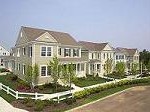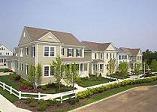 Johnnie Brown has waited three years to buy a home. In April 2008, he entered a lottery for one of 72 affordable housing units in Lakewood. His was the 400th number picked. So the 47-year-old housekeeper and father of four focused on building his credit — attending programs, paying bills on time. When another chance for a subsidized mortgage comes around, he’ll be ready. “I’ve just been waiting on the houses to get built,” Brown said. His chance might be coming soon. Following a yearlong delay, another lottery is on the horizon for 60 more townhouses. Yet the project that these units are a part of still faces logistical and image challenges. After the first 72 condominiums of what is slated to be one of the state’s largest purely affordable housing efforts were built and sold off Vine Avenue, questions arose over whether the project was shaping to be as diversified as it should be.
Johnnie Brown has waited three years to buy a home. In April 2008, he entered a lottery for one of 72 affordable housing units in Lakewood. His was the 400th number picked. So the 47-year-old housekeeper and father of four focused on building his credit — attending programs, paying bills on time. When another chance for a subsidized mortgage comes around, he’ll be ready. “I’ve just been waiting on the houses to get built,” Brown said. His chance might be coming soon. Following a yearlong delay, another lottery is on the horizon for 60 more townhouses. Yet the project that these units are a part of still faces logistical and image challenges. After the first 72 condominiums of what is slated to be one of the state’s largest purely affordable housing efforts were built and sold off Vine Avenue, questions arose over whether the project was shaping to be as diversified as it should be.
Rather than blame an unfair process, some black and Latino leaders pointed to a lack of preparation and enthusiasm from their minority home-seekers — not to mention that, by this time, Orthodox Jews’ majority in the 72 units comes close to matching its majority of Lakewood’s population.
Still, concerns remained, and, in part, to quell them, housing leaders made a point of identifying a different kind of development as the likely next phase of the 400-unit project — one by a different developer that offers smaller and cheaper homes.
That is no longer the plan. Instead, the next phase will probably be an extension of the first 72 units, developers say, causing at least one housing watchdog to turn skeptical.
“We want to see as much affordable housing moving forward as possible,” said Adam Gordon, an attorney with the statewide Fair Share Housing Center. “Why one development is moving forward and the other developments aren’t is what we’d like answered.”
The answer, according to project developers, lies with a water pump station. For more than a year, the entire project has been held up by a pump station that can’t seem to be realized. Yet the 60-unit extension was able to bypass the snag when engineers discovered they don’t need it. Because of an increased sewage pipe capacity and the slope of the land, they can work off the existing main pump station, said the developer, Shmuel Lefkowitz. Read Zach Patberg’s full artcle in APP.


What does jonny want? To live in a frum development? To be a שבת גוי ? Who will his kids play with? ??
Maybe its not about being a frum development. This is government funding at leagally it should be open to everyone.
His kids should be able to play wtih your kids ,after all we all live in the same town.Why Not?
I live nearby and find it very interesting that out of all 72 units, only one of them is not occupied by an orthodox jew. I am not at all anti-semitic and I get along very well with ALL of my neighbors. I really wish someone could do the math for me as to how “by this time, Orthodox Jews majority in the 72 units comes close to matching its majority of Lakewoods population”.
There were many non Jews picked in the first drawing. But let’s face what the majority of the population is and allot of the non Jews and a handful of the Jewish winners were not able to procure mortgages and meet the astronomical amount of clauses the GOVERNMENT makes them meet.
so he wont have to worry about drugs or murderers next door!
You still did not come up with a logical ratio of 71:1.
Joey,
You are such a TIPOSH!!
This lottery was probably the mosty heavily scrutinized in the history of low income housing. There were many non Jews who were lucky enough to get the first slots in the lottery. The problem is that they could not qualify for the mortgages. The jewish people have a support system of family and relatives. And friends who will help them by co signing on the loans and whatever other help is required to make sure they are approved for the loans. It is a shame that the non jewish community does not have the same support system of family and friends who will co sign and guarantee their loans. That is why the ratio is so high.
I have always said this to m non jewish friends. Instead of complaining how the Jews in Lakewood seem to get so much help. , just go out and create the same support system and network of friends and family to care about each other like the jewish people do. We treat each other like brothers. If you would do the same then yoyu would have only positive results.
Yosef makes a intelligent and mature argument, He is obviously a very smart articulate nice positive and ehrlicher human being.
Johnnie Brown is not the only housekeeper and father of four that did not win. I myself, and a couple of other people I know also did not win.
I was there at the lottery drawing and I also happen to be a local mortgage broker. There were quite a few non orthodox that won. The problem was (and I know this factually) that they weren’t able to get mortgages, mainly because of poor credit. Most of the orthodox had a good credit history, and therefore had a much easier time getting mortgages. I don’t think it’s called discrimination when banks don’t give loans to people with a bad credit score.
What I don’t understand is; why is my tax money going to build a synagouge in a goverment subisidized development. What about seperation of church and state.
Your tax money didn’t build a synagogue. It built a multi-purpose clubhouse. By vote of the homeowner’s association, a portion of it was converted to a synagogue. Any additional expense incurred was taken from private contributions.
You can try to spin it anyway you want. you have a development which is just starting which you say will be open to both jews and gentiles, but you already gave the clubhouse to the synagouge. Even in private developments like Coventry Square which is a finished development that is Majority jewish the Clubhouse is seperate from the synagouge. Then you wonder why the gentiles fell that the plan all along was for this to be a jewish onlyu development.
Its a decision left up to the homeowners association in every development. If over it time it happens that the demographics of the development change, the homeowners association is in no way bound to keeping the clubhouse as a synagogue.
why do we need an out side persen to build this developments? why cant we get some body local from Lakewood we have builders and developers looking for work
As a neighbor, I wonder how so many of these “low to moderate income” people are able to drive foreign leased cars! Many leasing more than one. It’s also interesting how so many of these “kollel” families actualy have a nice income but are working off the books. Yes, there are some truly needy families there who otherwise would never have been able to afford a decent home and this was a wonderful opportunity. It is sad that so many of the 71 home owners abused the system to be able to live a good life.
The “lease” from the association to the synagouge was put into place befor anyone moved in or voted something is fishy here. I think the aclu and naacp should get involved.
For the record it is cheaper to drive a foreign leased car at 200 to 300 a month than it is to buy a used car with downpayment and pay the inevitable monthly repair bills at the mechanic . Ive tried the used car route and I realized you have to be rich to afford the used car . I now lease a “foreign car ” ( the american cars have no resale value so the monthly kease payments are too high ) Being moderate income and qualifying for a mortgage assumes you are working and need a car to drive to work . moderate income does not mean homeless and on welfare as you seem to think it means .
0
I happen to know 6 out of the 71 families that moved in and none of them that I know make any money off the books. Some of them do have leased cars, but what’s wrong with having a leased car? Are you jealus of them? Most of these people live extremely simple – ask them if you can vist their homes and you’ll see the inside of most of them are as simple as it gets. The 3 people that I know that have leased cars, have them because they need reliable transportation to work (no – there is no bus that they can take to the place where they work). It is probably more cost effective to have a car with higher monthly payment versus buying an old car and have to frequently bring the car to the mechanic and for that duration of time taking car services to work (which are very expensive).